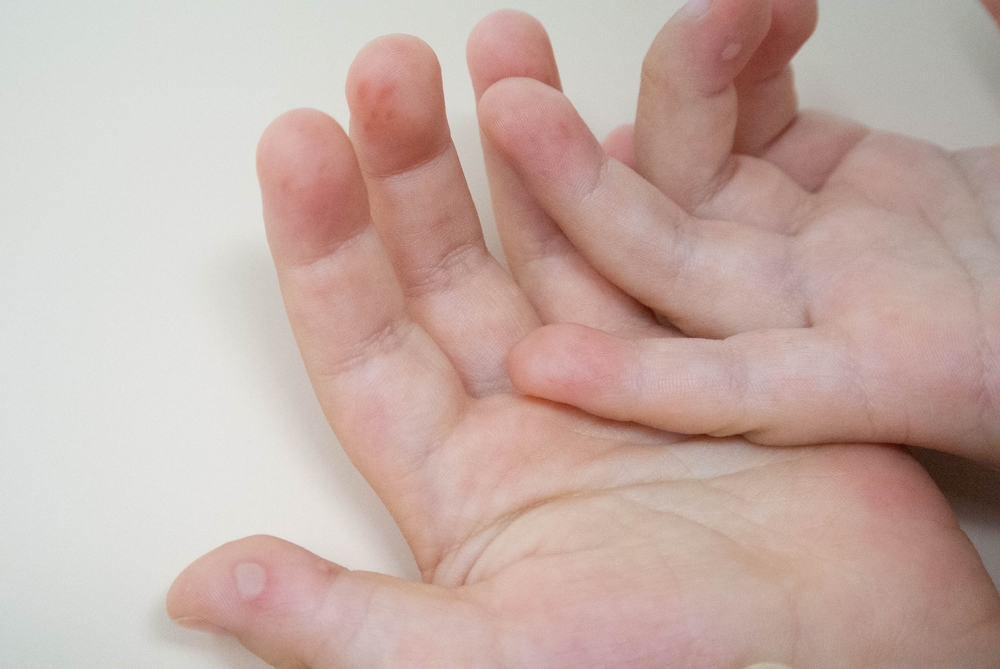What is hand, foot, and mouth disease (HFMD)?
The disease causes blister-like eruptions to form in the mouth, and on the hands, feet and sometimes more widely over other areas of the body. It is not to be confused with foot-and-mouth disease which is an unrelated illness that affects animals only.
HFMD is caused by viruses that belong to the enterovirus group such as coxsackie viruses and enterovirus 71 (EV71). The EV71 infection is of particular concern as it more likely associates with severe outcomes like viral meningitis. The usual peak season for HFMD in Hong Kong is from early summer to autumn and, a smaller
peak may also occur in winter. Hand, foot, and mouth disease usually goes away on its own within 7 to 10 days. There are treatments to help with
its symptoms.
What are the symptoms of HFMD?
● Blister-like rash – This is the main symptom that forms in the mouth, and on the hands, and feet. They can look like small red spots, bumps, or blisters. The sores in the mouth can make swallowing painful. The sores on the hands and feet are not usually painful. It is possible to get the sores only in some areas. Not every person gets them on their hands, feet, and mouth.
● Cold-like symptoms, such as loss of appetite and mild cough.
● A moderately high temperature of around 38-39°C (100.4-102.2°F) Life-threatening complications such as brain infections (encephalitis) have been reported during epidemics of HFMD caused by the enterovirus 71. However, these complications are very rare.
How does HFMD spread?
A person with hand, foot and mouth disease is highly contagious until about a week after the symptoms begin.
The infection can be spread by contact with:
- nose or throat discharges
- saliva
- fluid from vesicles
- patients’ stool
- after touching contaminated objects.
People with hand, foot, and mouth disease are most likely to spread the infection during the first week of their illness.
Who is at risk?
HFMD occurs mainly in children under 10 years of age but can also occur in adults. Young children will not have been exposed to the virus and will not have developed antibodies against it, putting them at higher risk of catching the disease. Once they have had the disease, anti-bodies develop and provide immunity. However, because more than one virus can cause HFMD it is possible to get HFMD a second time if exposed to a different virus from
the same group.
The risk of infection during pregnancy is very low because HFMD is generally rare in healthy adults due to exposure to the virus as a child themselves.
If you are pregnant and you develop HFMD please be reassured that:
● Most enterovirus infections during pregnancy cause mild or illness in the mother and there is no clear evthat maternal infection causes problems with the pregnancy or harm to the unborn baby.
● During the first three months of pregnancy – in very rare cases, if the maternal infection causes a prolongetemperature (fever) this may induce a miscarriage
● Shortly before you give birth – the infection can be passed on to your baby but most babies born with Hhave only mild symptoms. Only on rare occasions, complications may be severe and affect the baby’s organs.
What is the treatment?
The infection itself is not treated. It usually goes away on its own within a few days. However, the sores in the mouth can be painful and fever can be hard to control.
When to see a doctor?
Your doctor can determine the difference between HFMD and other causes of mouth sores and rashes. You should particularly see your child’s doctor if:
● Your child is drinking less than usual – It is important to make sure that children get enough fluids so that they don’t get dehydrated
● A fever of 38-39°C (100.4-102.2°F) or higher develops – Fevers can exacerbate dehydration
● Sores in the mouth are too painful – These can make swallowing painful, so some children might not want to eat or drink. Cold foods, like popsicles and ice cream, can help to numb the pain. Soft foods, like congee or mashed fruit or vegetable might be easier to swallow.
How can HFMD be prevented?
The most important thing you can do to prevent the spread of this infection is to wash your hands often with soap and water, even after your child is feeling better. You should teach your children to wash often, especially after using the bathroom. It’s also important to keep your home clean and to disinfect tabletops, toys, and other things that a child might touch.
If your child has HFMD, keep him or her away from other people during the first week of the illness.
Dr Dede Chan MBChB (UK), LMCHK, MRCGP (Lond)






